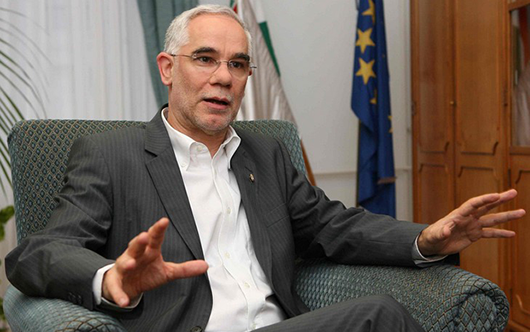
Mr Zoltan Balog
Mr Zoltan Balog, Hungarian Minister of Human Capacities, who is leading a government delegation to Ghana, on Monday announced a scholarship agreement that would enable 50 Ghanaian students to study in various disciplines in his country.
The students would be offered slots in agriculture, the oil industry, IT, arts and music.
Mr Balog, who made this known during a meeting with officials of the Ministry of Education in Accra said the agreement is part of a new strategy to support countries in the South.
He expressed gratitude that after 30 years, Hungary is reactivating relations with countries of the South especially with Ghana of long standing friendship.
Mr Balog, who is in charge of eight ministries comprising Education, Culture, Health care, Social Affairs, National Minorities, Religious Affairs and Sports, controls 60 per cent of his country’s budget.
“After 30 years, Hungary in April this year, opened an Embassy in Accra,” he said.
He said his five-day visit to the country would include a meeting with officials of the Ministry of Foreign Affairs and Regional Integration, where he would discuss the need for visa free connection for diplomats and Diplomatic Service Passports.
Mr Balog would also meet the Sports Minister, where he would discuss bilateral sports co-operation and also holds talks with officials of the Ministry of Gender, Children and Social Protection.
He announced a $ 10,000 UNICEF package with Hungarian money for child protection support in Ghana.
Mr Enoch H. Cobbinah, Chief Director of the Ministry of Education, expressed happiness for the scholarship package.
He said Ghana’s educational priorities are on oil and gas and the training of technicians.
He said Ghana would be also pleased to co-operate with Hungary in the areas of agriculture, business/economics, infrastructure and engineering.
Mr Cobbinah also called for the training of more Ghanaian students in Hungary.
“Ghana will be happy to receive a business delegation from Hungary interested in the educational sector, with the emphasis on technical and vocational training,” he said.
He said government is upgrading the polytechnics into technical universities and computerising a number of schools to be up to date with ICT.
Mr Cobbinah noted that government investments in these areas were driven by interventions such as Public Private Partnership.
Dr Lawrence Tetteh, a Ghanaian International Evangelist and Economist who was trained in Hungary, asked Hungary to review its decision to stop the training of medical students from the South.
Source: GNA























